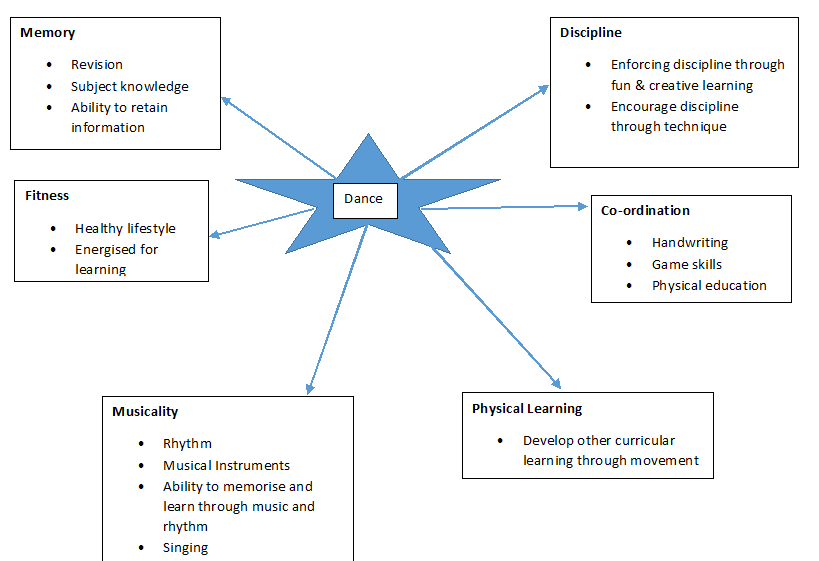Is there a need for dance within the national curriculum?
A question I believe needs a firm answer of YES!
Just today I had a discussion with a Deputy Head who observed one of my lessons with a year 4 class. She expressed how she could see how beneficial Dance could be in aiding coordination, which not only helps with balance and physical movement but it crosses over into other subjects aiding Handwriting and presentation skills. This is just one of many reason why Dance can play a key part in the development of a chid through education.
I decided to look for study's or pieces of research on the relevance Of Dance within the Education system as I feel this could be a great way to include many of my questions under one inquiry topic. I stumbled across a piece published in 1992 by Lynnette Young Overby ERIC Clearinghouse on Teacher Education Washington DC (http://www.vtaide.com/png/ERIC/Dance-in-Ed.htm) The research displays current (1992) percentages of participation, curriculum objectives and identifies barriers towards dance the schools may face.
''Dance is usually taught as a part of the physical education curriculum. In a survey of 31 state departments of education, 89% of elementary school dance was taught by physical educators (DeBryn, 1988). Secondary dance programs have been described as "understaffed, underfinanced, and unapplauded" (Posey, 1988). A recent nationwide survey of secondary schools found (a) the majority of dance classes are taught in physical education departments, and (b) the styles of dance most frequently offered are aerobic (45%), folk (11%), ballet (9%), social (8%), and creative or ethnic (7%) (Pappalardo, 1990).
At least 15 states have developed dance curriculum guidelines, including California, Florida, Georgia, Idaho, Illinois, Indiana, Michigan, Minnesota, Ohio, North Carolina, North Dakota, South Carolina, Texas, Utah, and Wisconsin (Hilsendager, 1990). Except for North Carolina, however, no states have mandates that the guidelines be implemented (Gingrasso & Stinson, 1989).
Many of the curriculum guides contain specific content, goals, objectives, and limited measurable outcomes for such areas as:
* Dance techniques for social, modern, and ethnic dance;
* Aesthetic perception;
* Kinesthetic sense;
* Creative expression;
* Choreography
Dance elements can also be integrated into other subject areas, which may increase the likelihood of dance being included in the school curriculum (Burke-Walker, 1989). Hanna (1992) provides an example of a physics class in which principles of momentum, force, velocity, and energy are applied to dance to improve dance performance. Franke (1989) identifies connections between writing, tennis, and dance.''
Another study Dance Education in Elementary Schools by Liora Bresler, an assistant professor in curriculum instruction at the University of Illinois 1987 to 1990, demonstrates issues still very much relevant today as regards to the fears general teaching professionals have when it comes to teaching dance...lack of subject knowledge, resources and advice.
''Not only did teachers have no knowledge base in dance or dance education, there was a lack of resources to help them become more knowledgeable. There were few dance education resources. And there seemed to be no vision of what a dance curriculum could be. The general sympathy that some teachers shared for dance was hard to translate into curricular activities and lesson units. The task of curriculum development in dance is compounded by its lack both of tradition and of availability of materials. Formal materials are rare. Videotapes or books that support learning objectives in dance are not easily accessible to teachers. Unlike the disciplines of music and visual arts education where there are textbooks, detailed methods, and lists of objectives, dance has few resources for curriculum planning. In the schools I studied, when it came to evaluation of student dance work, teachers had no preparation and no expertise to make artistic judgments. In this vicious cycle, there are few programs and resources from which to draw, few job opportunities, few materials designed for experts, and few professional organizations. These problems interact with the lack of budget, time, and priorities within the schools, mutually shaping each other.''
When looking over study's and research I found few published within the last 10 years with specification on the importance of Dance within Education, I found many articles and opinion blogs on the subject but little factual research. I also felt many of the study's I did come across had been developed in the States as apposed to the UK ...I feel this could be a good direction to head my inquiry.
